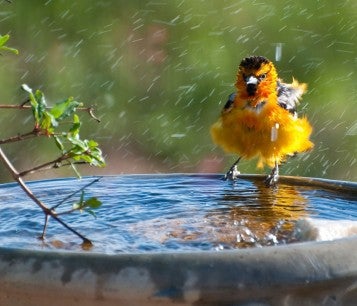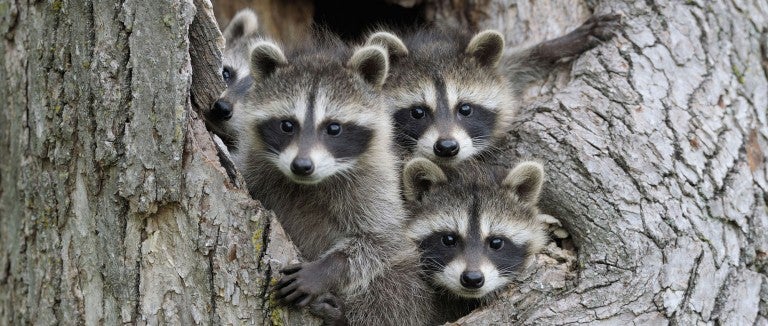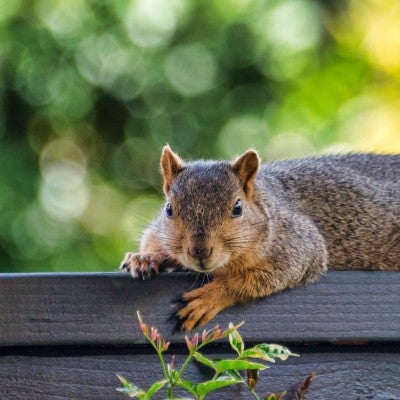Found in almost every major urban, suburban and rural habitat in the 48 adjoining states, raccoons don't know that our trash cans, vegetable gardens, bird feeders and chimneys aren't for them—they’re just trying to survive. When these clever creatures take advantage of the food and shelter we (unintentionally) provide, they can get into trouble. Fortunately, there are inexpensive, humane and effective ways to prevent and solve problems with raccoons.
Contents
- How can I stop raccoons getting into my trash can?
- How can I keep raccoons away from my dog, cat or other pets?
- How can I keep raccoons out of my chicken coop?
- How can I keep raccoons away from my yard or pond?
- How can I stop raccoons eating out of my bird feeder?
- How do I know if I have raccoons in or around my house?
- What should I do if a raccoon got into my house? How can I get a raccoon out of my house, attic or chimney?
- Do raccoons have rabies or other diseases?
No matter how big or small your outdoor space, you can create a haven for local wildlife. By providing basic needs like water, food and shelter, you can make a difference in your own backyard.

How can I stop raccoons getting into my trash can?
When raccoons get into trash, it's not a raccoon problem; it's a trash problem.
- Purchase wildlife-proof trash cans.
- Secure lids with bungee cords, rope tie-downs or weights.
- Keep trash cans in a shed or garage until pick-up day.
- Freeze smelly foods like fish between pick-up days.
How can I keep raccoons away from my dog, cat or other pets?
Feeding pets outside is the most common reason for raccoon-pet conflicts. To reduce the chances of your pet having a close encounter with a raccoon:
- Never intentionally feed raccoons.
- Avoid feeding pets outside. If you must feed pets outside, pick up food as soon as they’re finished eating.
- Don’t allow dogs to roam outside unsupervised and keep all vaccinations up to date.
- Avoid the use of cat and dog doors, or use microchip-enabled smart doors that only open when they detect your pet's microchip.
- Keep cats, rabbits and other small pets indoors.
If your pet does come into contact with a raccoon, contact your veterinarian.
How can I keep raccoons out of my chicken coop?
The only effective way to protect chickens is to have a coop with sturdy walls, a roof and a pop door that opens to a secure run. Chicken wire is not wildlife-proof. Instead:
- Use 16-gauge, 1-inch by-1-inch galvanized welded wire to protect all windows and openings. Using the same material, bury a welded wire footer in the shape of an "L" approximately a foot deep and 4-6 inches wide around the perimeter of your coop and run.
- Use an automatic coop door that opens and closes at set times to ensure you never forget to close the coop door at night. Although chickens are always vulnerable to predators, many predators feel safer attacking chickens when it's quiet and dark at night.
- Regularly check the perimeter of your coop and run for new openings or signs of digging.
Although it can be hard work, once an animal enclosure is secured and maintained, the possibility of a raccoon entering your coop is eliminated.

How can I keep raccoons away from my yard, pond or garden?
Raccoons can damage lawns (especially recently sodded ones) by digging for earthworms and grubs, which surface when lawns are wet. This is generally a short-term problem that lasts only as long as the rain or watering does. Raccoons might also make a temporary den in a woodpile or eat from your vegetable garden or pond.
- Try hot sauce or a capsaicin-based repellant around the perimeter of what you're trying to protect.
- Install motion-activated lights and sprinklers.
- Set up a battery-operated radio tuned to an all-night talk show and turn it on for a few nights to drive raccoons away.
- Remove any wood that was used for a den and burn it outside to destroy roundworm eggs.
- Keep ponds at least 3 feet deep. Provide places for fish and frogs to hide using aquatic plants, rocks and cinder blocks with holes in your pond. Pile or stack rocks and blocks in groups of three. (This will also prevent other pond predators.)
- In extreme cases, where it's allowed and won't harm children or pets, you can use single-strand electric wire or fencing (4 to 8 inches off the ground) around raised vegetable beds or to protect fish in backyard ponds.
How can I stop raccoons eating out of my bird feeder?
The simplest solution to raccoons at your bird feeders is to remove them at night and put them back outside in the morning. If that’s not an option, you can:
- Remove your bird feeders for a week. When the seed disappears, raccoons may seek other places to eat.
- Hang your bird feeders on poles a half inch or less in diameter, securing the pole firmly so it can’t be knocked over. Raccoons cannot climb such a thin pole and they won’t be able to tip it over to access the seed.
- Suspend your bird feeders from a wire extending between two trees, or set up a clothesline for hanging the bird feeder, isolated from tree branches or other structures that might provide access for raccoons.
- Reduce the seed that falls to the ground (an attractant for raccoons) by using only one type of seed per feeder and using feeders that catch fallen seed.
- Purchase a bird feeder raccoon guard. A good one is shaped like a stovepipe and placed on the pole portion of the bird feeder. It allows the raccoon to climb up the pole and into the closed pipe, but prevents them from going further. The pipe must be at least 24 inches long to prevent the raccoon from climbing over it and set at least 4 feet off the ground (up to the bottom part of the baffle) to keep them from jumping over it.
- Store your birdseed supplies in galvanized metal cans with tight lids.
- Consider removing bird feeders altogether and installing native plants instead, which serve as natural bird feeders without attracting raccoons.
Don't grease up feeder poles or wires to prevent raccoons. If grease gets on a bird’s feathers, they can’t preen it out, leaving the bird vulnerable to predators, bad weather and disease.

How do I know if I have raccoons in or around my home?
Hearing strange noises in your attic or chimney? Sometimes raccoons are blamed for damage they don’t do. Here are signs you have a raccoon in residence:
- Hand-shaped tracks on light surfaces or where the ground is soft enough for their paws to leave an impression. Like bears, raccoons walk on their entire paws, not just the toes.
- Oily smudges or “rubs," tracks, and/or hair caught on the edges of entry points around roof-line openings, gable vents or attic vents (raccoons can enter openings as small as 3.5 inches in diameter.)
- Sooty raccoon prints going up or down a gutter downspout may indicate that a raccoon is using a nearby open chimney.
- Noises in walls and attics (such as plodding footfalls) at night and in the evening and early morning hours.
- Vocalizations from young (chittering, mewing, or crying sounds).
- Scat about 3/4” in diameter and 2-3” long with segmenting and blunt ends. Raccoon scats vary widely in size, depending upon the raccoon’s age, and in content—which is often quite evident, depending on what has been eaten.
- Latrines in the attic or void (nonliving) spaces where an animal has repeatedly left scat. If feces have accumulated, follow the Centers for Disease Control’s removal recommendations or hire cleanup professionals to safely clean the latrine area.
What should I do if I raccoon got into my house? How can I get raccoons out of my house, attic or chimney?
Occasionally, a raccoon may accidentally enter your home through a pet door or other entryway with no intention of staying.
Raccoons in your home by accident
Never try to catch or directly handle a raccoon. A panicked and scared raccoon may bite. The raccoon is going to be mainly concerned about getting back outside, which is helpful—you just need to show them the way!
- Stay calm. A panicked raccoon may run further inside your house and may cause damage.
- Contain pets in rooms away from the raccoon and close doors to other parts of the house.
- Open doors and windows near the raccoon that lead outside. (A chair under a window will help the raccoon jump up.)
- Move quietly and slowly and try to nudge them back out by walking behind them with a vacuum cleaner or broom.
- If that doesn’t work, leave the room and wait quietly for the raccoon to escape. Make a trail of marshmallows, cheese bits or fig bars leading out an open door. Sprinkle a band of flour in front of openings so you can see exiting footprints if they leave.
- If the raccoon doesn’t leave after you’ve tried for several hours, call your local animal control officer for assistance.
Once the raccoon has left your home, think about how you can prevent raccoons from entering your home again. For example, if the raccoon entered through a pet door, replace the pet door with a locking or microchip-activated pet door. You can also implement our raccoon prevention techniques.
Raccoons in your attic, crawl space, etc.
Raccoons mate in late winter and use a wide range of natural and manmade den and resting sites that may include unprotected attics and crawlspaces.
Raccoons often find their way into attics at entry points where different building materials join; this might be where dormer junctions occur, where unpainted trim board creates structural defects, or where the building material itself is pliant, such as where vinyl soffits have been used.
If raccoons are in your attic, the most humane solution is to wait until the cubs are old enough to leave the attic with mom (generally around 10 weeks old), and then seal up any entry points after you have ensured that all the raccoons have left. To determine if the raccoons have left:
- Block possible entry points loosely with wadded newspaper. Leave in place for two to three days.
- If the newspaper goes undisturbed, and the weather has not been particularly cold or stormy, no one is using it as an entryway. You may now seal up the entry point. Cover the entry point with 16-gauge wire mesh or metal flashing to prevent future wildlife from moving in.
- If the newspaper is pushed out of place, someone has moved in, and it is not safe to seal up entry points at this time.
If waiting for the raccoons to leave on their own is not an option, you can encourage the mother to move the young on her own by creating a multi-sensory deterrent approach.
- Just before dusk, turn all lights on in the attic.
- Place a loud radio and a bowl of cider vinegar in or around the attic.
- Give the mother raccoons a few days to move her cubs.
- After a few days, ensure that raccoons have left.
- Seal available entry points with 16-gauge wire mesh or metal flashing to prevent future wildlife from moving in.
- If raccoons have occupied the space for a long time and feces have accumulated, follow the Centers for Disease Control’s removal recommendations or hire cleanup professionals to safely clean the latrine area.
Some people use a “one-way door” to get raccoons out of attics or crawl spaces. Once the animals have left, they're unable to get back inside. Use of these doors is best left to humane wildlife professionals, who can make sure that mothers are not isolated from their kits. The young must be old and mobile enough to exit through the one-way door with their mother, and this can be very hard to assess.
Raccoons in your chimney
When a mother raccoon sees an uncapped chimney, she sees the perfect nursery. It’s a safe and sheltered place to give birth to and raise her young until they can get around on their own.
Never use smoke or fire to try to drive animals out of chimneys! Young raccoons won't be able to climb out, and mom will stay with them. They will become trapped and die, making your removal problem far worse. The easiest and most humane approach is to wait until after they move out on their own, which they will, after which you can install a chimney cap to prevent future issues. Always ensure that all animals have vacated the chimney before installing a chimney cap.
If waiting isn't an option, you can use humane and multisensory harassment techniques to encourage the mother raccoon to move her young elsewhere:
- Keep the damper closed and put a loud radio (tuned to a rock or rap station) in the fireplace.
- Put a bowl of vinegar on a footstool near the damper.
- Apply these deterrents just before dusk; mother raccoons may not want to move cubs in daylight. Be patient—it may take a few days for the mother to move her young.
- Once the raccoons are gone, call a chimney sweep to clean the flue and install a National Fire Protection Association-approved expanded metal chimney cap so the situation doesn’t happen again.
If one is available in your area, you may also enlist the help of a humane wildlife professional who will commit to keeping the raccoon family intact and releasing within their home range by using an eviction, exclusion and reunion strategy. As soon as the raccoons are gone, call a certified chimney sweep to clean your chimney of all nesting debris, and install a chimney cap.

Do raccoons have rabies or other diseases?
Rabies
According to the Centers for Disease Control and Prevention (CDC), only one human has ever died from the raccoon strain of rabies. A rabid raccoon is usually dead within 1-3 days of becoming infectious, and if you're bitten by a rabid raccoon, effective post-exposure treatment is available.
If you see a raccoon in your yard during the day, don’t panic—they’re not necessarily sick or dangerous. It's perfectly normal for raccoons to be active throughout the day. They may merely be foraging longer hours to support their young, visiting a garden while the dogs are indoors or moving to a new location.
Observe the behavior of the raccoon before calling for assistance. Look for:
- Partial paralysis or inability to use their limbs well
- Circling or staggering as if drunk
- Repeated high-pitched vocalization
- Self-mutilation
- Acting aggressively for no reason
A raccoon showing these signs may be rabid or infected with canine distemper or feline parvovirus. Call your local animal control or police department. If you made contact, seek medical attention immediately.
Roundworm
Roundworm (Baylisascaris) found in raccoon feces can infect humans and pets. Prevention is the key. Keep raccoons out of attics and crawl spaces, and supervise young children and pets outdoors to make sure they don’t come into contact with raccoon feces.
Leptospirosis
Leptospirosis is caused by a bacteria that can infect raccoons, skunks, opossums, Norway rats, mice and white-tailed deer. Humans may be exposed if they come into contact with infected urine or contaminated soil and water. Avoid touching wild animals. If contact is necessary to get a raccoon out of your house, call in a professional.

